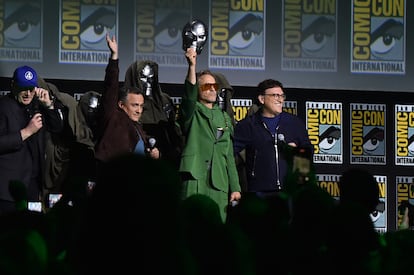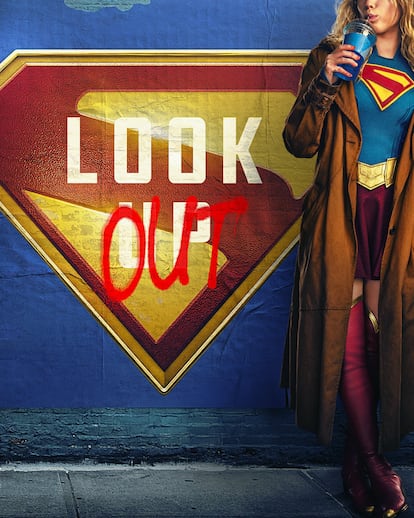Superheroes no longer save the box office: fatigue, saturation, or a paradigm shift

In 2014, an obscure superhero movie featuring an alien tree and a sassy raccoon grossed $774 million (about €660 million) and became the third most-watched film of the year. The success of Guardians of the Galaxy confirmed that Marvel could do anything , and audiences would flock to see it. That was how the following years would go: an African king , a caped sorcerer , or a foul-mouthed mutant who never dies would arrive. Any Marvel comic was worthy of a film adaptation. That year, there were also three Marvel films among the top 10 highest-grossing films. And exhibitors happily welcomed any of those releases that managed to bring viewers to the theaters. By 2025, however, the box office king of recent years "is no longer the tide that pushes the rest. Superheroes no longer guarantee number one," Dave Gonzales, author with Joanna Robinson and Gavin Edwards of MCU: The Reign of Marvel Studios (2023), a detailed book on Marvel's reign in cinema, told EL PAÍS.
Twenty years later, can we still talk about “superhero fatigue”? “Yes, it’s here,” replies Ben Fritz , a journalist for The Wall Street Journal, via email, who wrote the book The Big Picture (2018). the foundations of contemporary Hollywood. But these two experts aren't the only ones saying this; what's really speaking are the disappointing numbers from summer releases. For the first time in 17 years (since The Dark Knight ), a film from the DC universe, Superman, has surpassed Marvel's films in box office takings. Even so, despite being the sixth highest-grossing film of 2025, its $600 million will be about $50 million below what the superhero's previous solo film, Man of Steel , earned in 2013, mainly due to its poor results outside the US (at home, it's been good). Not even the inflation since 2012 can help overcome it. "It's the end of a 15-year cycle of franchise dominance . Nobody knows what will bring people back to theaters. In fact, we keep talking about 'going back to theaters' as if we're going to get back to pre-pandemic levels," warns Gonzales.
Since 2011, there has always been a superhero movie among the five most-watched, except in 2017 (which did have four in the top 10) and, obviously, in 2020 due to the pandemic. In 2018, it was four out of five. In 2019, three were from Marvel: Avengers: Endgame took the crown with $2.9 billion, but both Spider-Man: Far From Home and Captain Marvel surpassed the magic number of one billion dollars. That year, nine films reached that number, something that seems impossible today despite inflation. In 2021, Spider-Man: No Way Home topped the box office, and 2022 saw four superhero films among the top 10 most-watched films.
This year, there may not be a single Marvel movie. Thunderbolts , a reunion of secondary TV villains, doesn't even reach $400 million. The new Captain America , also a sequel to its own series, falls on par with Eternals , a flop . Fantastic Four: First Steps , the fourth adaptation of the superhero team and an attempt at a more complete story, settles for scraping together $500 million. The sharp weekly box office declines show that while the faithful turn out for the premiere, some of the general public has been lost.
What are the reasons for the shift? Experts talk about the end of a cycle, the wound in theaters after Covid (reaching 2019 numbers seems impossible), or fatigue from Marvel's overpowering television strategy . "It was difficult to maintain the momentum after Avengers: Endgame , the climax of 22 films and 11 years, but Marvel made it even more difficult with series . There was an overwhelming amount of content that alienated casual viewers and even devoted fans. Producer Kevin Feige has acknowledged that it became 'homework.' Also, by producing more, Feige had less time to focus on each project, and there have been many bad series and films," explains Fritz. Realizing the problem, Marvel has stopped producing a series per quarter, and in 2026 will only release one film ( Avengers: Doomsday , with Robert Downey Jr. and the Russo brothers returning as directors to recapture what they achieved with Endgame , a "band-aid," Gonzales predicts) and a new Spider-Man movie, to be distributed by Sony, not Disney. Both will likely be huge hits. Perhaps as a finale.

DC, meanwhile, is looking for a new voice after flops like Black Adam. and The Flash . “ Superman is moderately successful , although I'm sure DC would have liked to exceed 800 million. But as we are, 600 sounds pretty good. The problem is that the Asian market has taken a noticeable decline,” argues Fritz, who recounted in his book how Hollywood had prostrated itself before China to fatten profits . After the pandemic, that time passed, and now neither Asia nor Russia add up. That makes it increasingly difficult to reach 1 billion dollars, but the bulging budgets of these films need the old numbers to balance the figures. “The answer may lie in cheaper films that make a profit, but as theaters plummet, there is a competition to make a movie into a giant event. That costs money, and budgets skyrocket,” warns Gonzales. And the tunnel for cinemas is getting longer and longer, especially if they lose events that previously guaranteed to fill theaters and theaters (luckily they still have Avatar 3 this year).
The same applies to hopes for Fantastic Four , which, although Gonzales calls "a success, is not what Marvel was looking for. They needed a clear victory." Fritz also calls the film, starring Pedro Pascal , a "disappointment," even though it is the highest-grossing film about this superhero family. Like Superman , it earned more than 50% of its box office takings in the US. "It's possible that international markets are rejecting this Hollywood thing," warns Gonzales. In Spain, in particular, it has performed worse than expected, below Superman Returns (2006) or Fantastic Four: Silver Surfer (2007).
An industry that is difficult to replaceSteven Spielberg warned in 2013 that when several superhero movies flopped , the cycle would end and there would be a paradigm shift. What will replace them? This year, the box office podium belongs to the children: Lilo and Stitch. (the only one to exceed 1 billion, except for the Chinese Ne Zha II ), Minecraft or How to Train Your Dragon , but its audience is limited. Jurassic World: Rebirth surpasses 800 million, but it's still far from its previous releases. And Disney has gone six years without a Star Wars . Not even Pixar is making a profit. "There's no obvious substitute that will last," warns Fritz. "Perhaps we're on the verge of an era of risks in Hollywood. The auteur cinema of the seventies was born because the event movies of the sixties no longer worked with baby boomers , and the studios gave creative freedom. Today they don't even know what to do, with Marvel or Transformers losing steam. But "The Sinners" and "Weapons" have proven this year that people still go to the movies if they see an opportunity to participate in a cultural event. We need to look for more." The same thing happened with the surprise hit " F1: The Movie ," the highest-grossing project of Brad Pitt's career.
Almost everything Spielberg and Lucas said has come to pass. Including the $150 tickets to see The Wizard of Oz at the Spherical Theater in Las Vegas. pic.twitter.com/VzVHcvwPR7
— Pau Brunet (@PauBox) August 4, 2025
But now everything has to be measured differently. Curiously, Warner (the company responsible for DC) called Man of Steel , the previous Superman film, a disappointment due to the reviews and the poor performance of its sequels ( Batman v. Superman and Justice League ), but today its president, David Zaslav, wants to sell the DC relaunch as promising, despite the worsening figures: "The vision is clear, the time is now. It's just the first step," he said after the premiere of this year's Superman , directed by James Gunn, the man responsible for the relaunch of the universe . It will be followed by the series Peacemaker (which shares characters with Superman ), Supergirl , and the horror film Clayface , about Batman's enemy . The reviews, this time, have been supportive, and that may help. But that message is being sent because the executives are aware of the relevance of this intellectual property not only in film, but also in their product lines, theme parks, cruises, and ramifications in comics, series, and video games. “Marvel merchandise is still very strong. It's the same with Star Wars , where even though there aren't any movies, Grogu and Darth Vader T-shirts are selling,” Gonzales acknowledges.

Therefore, superheroes cannot cease to exist. Hollywood has too much at stake. But what will happen in five or 10 years? Batman and Spiderman will continue to thrive; the question is whether everything can be adapted, dominating the market as before. There are other rules. “They will always be around, because comics are a great inspiration and known worldwide, but they will just be another type of film, like animated films or action franchises,” Fritz believes. “I hope they abandon the idea of shared universes, where everything is a sequel. Marvel has the opportunity with Secret Wars to reset and for connections not to matter. And the X-Men can be a very different soap opera about marginalized people. They have to deconstruct themselves again,” predicts Gonzales, who thinks this shift may reflect “ franchise fatigue .” Barbie and Oppenheimer could have been the first step towards change. And he assumes: “I think people will continue to go see good movies. Period.”
- Ne Zha II : 1.619 billion euros
- Lilo and Stitch : 878 million euros
- A Minecraft movie : 814 million euros
- Jurassic World: Rebirth : €708 million
- How to Train Your Dragon : €534 million
- Superman : 511 million euros
- F1: The Movie : €510 million
- Mission: Impossible. Final judgment : 509 million euros.
- Fantastic Four: First Steps : €406 million
- Captain America: Brave New World : €354 million
EL PAÍS






